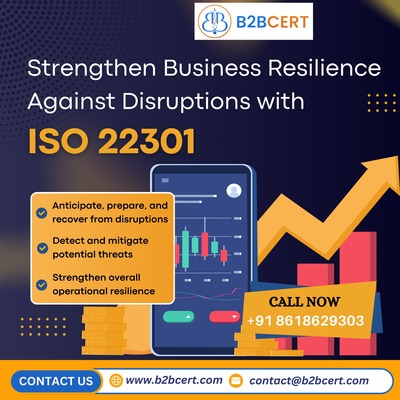What Are the Essential Components of a Business Continuity Plan
-
In today’s fast-paced business environment, unexpected disruptions can strike at any time. From natural disasters to cyber-attacks, companies face a myriad of threats that can impact their operations. This is where a robust Business Continuity Plan (BCP) becomes vital. ISO 22301, the international standard for Business Continuity Management Systems (BCMS), provides a comprehensive framework to ensure organizations can continue critical operations during and after a disruptive incident. For businesses in Bangalore, achieving ISO 22301 Certification in Bangalore can enhance resilience, stakeholder confidence, and operational stability.
Understanding ISO 22301
ISO 22301 is designed to help organizations identify potential threats and create structured responses to minimize the impact of disruptions. It emphasizes proactive planning, continual improvement, and the integration of business continuity into overall organizational strategy. Companies looking to implement this standard often seek guidance from professional ISO 22301 Consultants in Bangalore, who can tailor strategies to specific business needs.
Essential Components of a Business Continuity Plan
A comprehensive BCP under ISO 22301 typically includes the following critical components:
1. Business Impact Analysis (BIA)
The first step in developing a BCP is conducting a Business Impact Analysis. BIA helps organizations identify critical business functions, assess the potential impact of disruptions, and determine recovery priorities. It answers key questions such as which processes are essential, what resources are required, and how downtime could affect revenue, reputation, and compliance.
2. Risk Assessment
ISO 22301 emphasizes the importance of understanding risks that could threaten business continuity. Risk assessment involves identifying potential hazards, evaluating their likelihood, and estimating the potential impact on business operations. This assessment helps in prioritizing resources and preparing mitigation strategies to minimize risk exposure.
3. Business Continuity Strategies
Once risks and impacts are identified, organizations must develop strategies to ensure critical operations can continue during a disruption. This may include alternative work arrangements, redundant IT systems, supply chain diversification, or backup facilities. These strategies are central to ISO 22301 compliance and are designed to protect both people and assets.
4. Incident Response Structure
An effective BCP defines a clear incident response structure. This includes assigning roles and responsibilities to employees, establishing communication protocols, and setting up an emergency response team. ISO 22301 encourages organizations to document these processes, ensuring everyone knows their role during a crisis, which significantly reduces confusion and delays.
5. Emergency Communication Plan
Communication is critical during any disruption. ISO 22301 requires organizations to develop a communication plan that ensures timely information flow to employees, customers, suppliers, and regulatory authorities. The plan should include predefined templates, escalation procedures, and alternative communication channels in case primary systems fail.
6. Training and Awareness
A business continuity plan is only effective if employees understand it. Regular training, awareness programs, and simulation exercises are crucial components of a BCP. These activities ensure that staff are familiar with emergency procedures, can operate alternative systems, and respond effectively under pressure. Organizations often collaborate with ISO 22301 Services in Bangalore to conduct professional training sessions and mock drills.
7. Testing and Exercising
ISO 22301 mandates regular testing of the BCP to identify gaps and validate effectiveness. This may include tabletop exercises, full-scale drills, or scenario-based simulations. Testing helps organizations refine their plans, update recovery strategies, and enhance overall preparedness. Continuous improvement based on lessons learned is a core principle of ISO 22301.
8. Plan Maintenance and Review
Business environments are dynamic, and risks evolve over time. Therefore, a BCP must be reviewed and updated regularly. ISO 22301 requires organizations to document changes, conduct periodic audits, and integrate feedback from incidents and exercises. This ensures the plan remains relevant and effective, keeping the organization resilient against emerging threats.
Benefits of Implementing ISO 22301
Implementing ISO 22301 and having a well-structured BCP offers numerous benefits:
-
Operational Resilience: Ensures that critical functions can continue during disruptions.
-
Risk Mitigation: Helps identify and manage potential threats proactively.
-
Regulatory Compliance: Demonstrates adherence to international standards.
-
Enhanced Reputation: Builds trust among customers, partners, and stakeholders.
-
Competitive Advantage: Shows commitment to business sustainability and continuity.
For businesses in Bangalore seeking to strengthen their operational resilience, engaging experienced ISO 22301 Consultants in Bangalore can provide strategic guidance and practical support in developing, implementing, and maintaining a compliant BCMS. Additionally, professional ISO 22301 Services in Bangalore offer comprehensive solutions, including risk assessment, training, audit preparation, and certification assistance.
Conclusion
A robust Business Continuity Plan is no longer optional—it is a necessity for organizations striving to survive and thrive amidst uncertainties. ISO 22301 provides a globally recognized framework for developing, testing, and maintaining an effective BCP. By incorporating components such as business impact analysis, risk assessment, response strategies, communication plans, and regular testing, companies can ensure they are prepared for any disruption.
Organizations in Bangalore looking to enhance resilience and achieve international standards can benefit immensely from professional guidance in the form of ISO 22301 Certification in Bangalore, consulting services, and expert support for implementation. Investing in business continuity is investing in long-term stability and sustainable growth.
-





